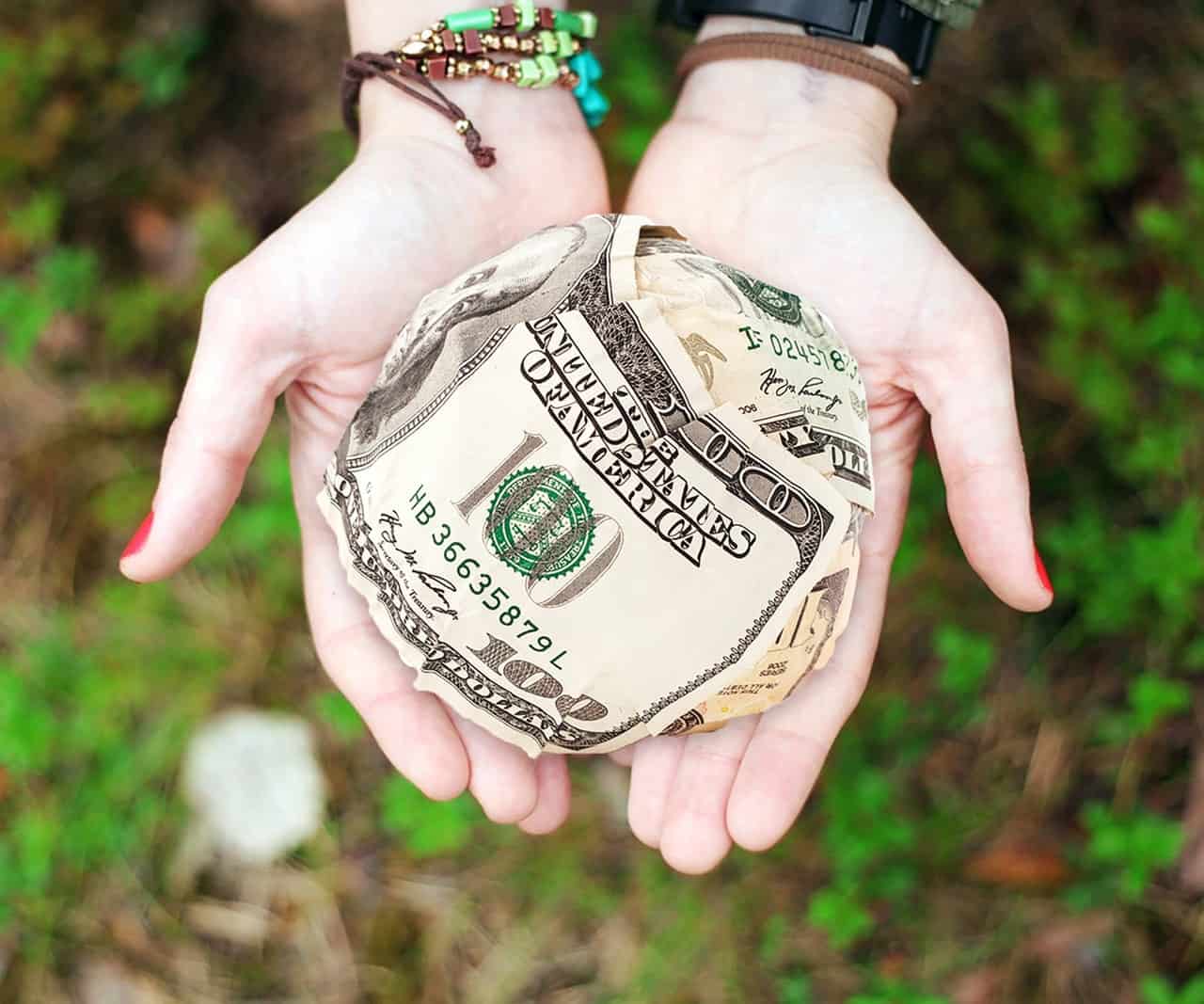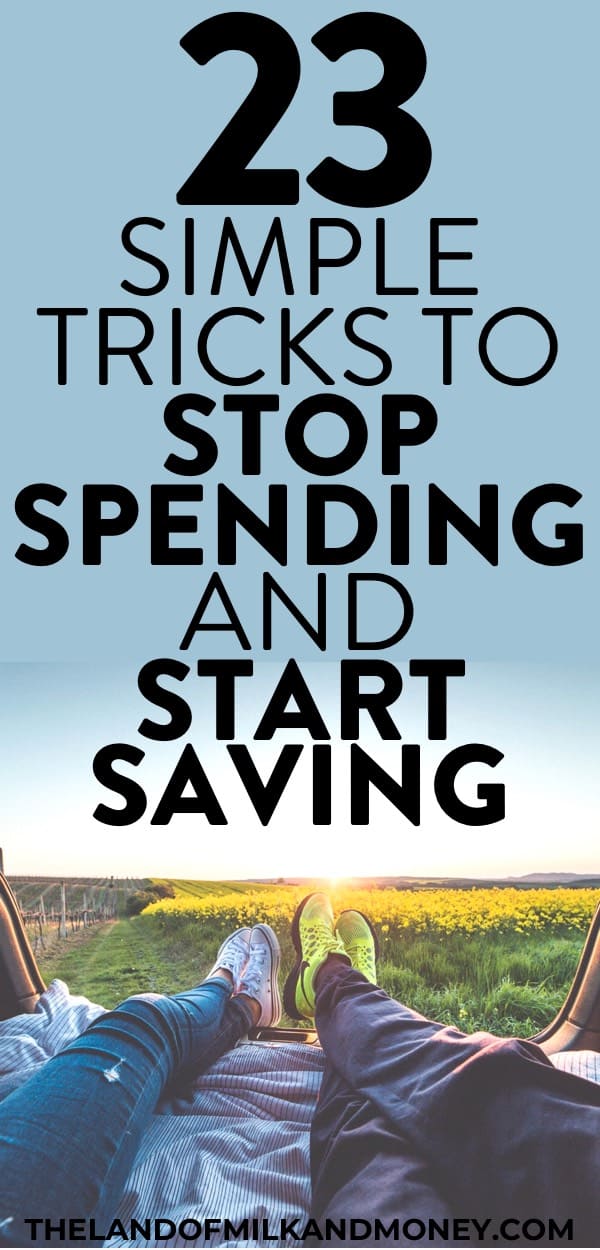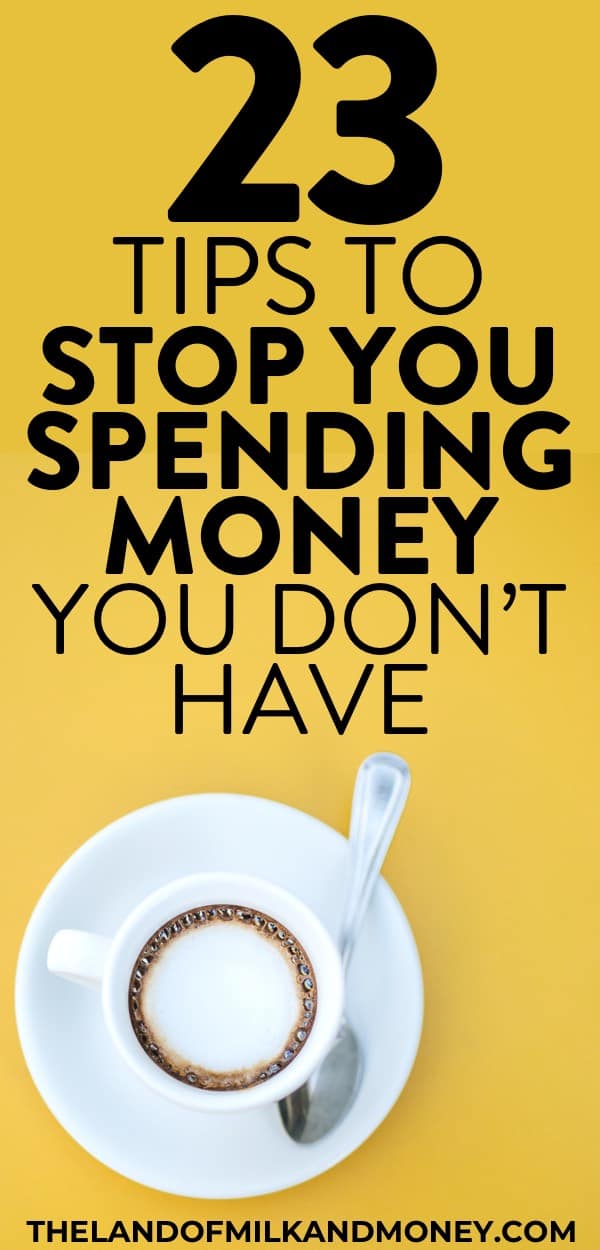There’s no two ways about it: working out how to stop spending money fast can be a game changer for your finances. You may not even realise just how spending money on unnecessary things or spending money you don’t have may be costing you way more than you think. Luckily, there are a range of ways to get your spending habits under control!

After all, there’s literally only one way to effectively manage your money:
Spend less than you earn
So if you’re spending too much for your income, then that’s a problem.
Obviously if you’re spending more than you earn, then that’s a MASSIVE problem. Going into debt to sustain your lifestyle should absolutely 100% be avoided.
If that’s you, it’s time to take some serious action to manage your finances.
And your first step should definitely be to stop spending money you don’t have.
But even if you’re spending less than your income, it’s always a good idea to look at where you can make further spending cuts.
After all, whatever you don’t spend can then be used for things like paying off debt, building an emergency fund or contributing to your 401(k) or other investments.
You’re probably not saving enough
Did you know that 65% of Americans save little or even nothing?
And what’s the main reason that most people gave for not being able to save more?
“Expenses”
So, sure, it’s easy to just “put that on the credit card”.
Or to say “absolutely, let’s go grab lunch at that cafe down the road, it’s only $20”.
Or to think “yeah, I’ve been working hard, I deserve that new car and I can totally afford that loan”.
But when the average American has a credit card balance of $6,375, don’t you think you deserve better than an overpriced salad or even some flashy new car that’s going to suck all your money straight out of your wallet?
Like, say, not having to use your hard earned money to pay thousands of dollars of interest on your debts – or being able to afford your retirement?
(If you’re not sure how much that’s going to cost you, check out the simple retirement calculator here.)
So if your expenses are getting in the way of securing your financial future, it’s time to see just how to stop spending money fast.
Don’t worry, I’m not going to suggest that you only eat plain rice or completely give up your social life.
But by seeing how to stop spending money on unnecessary things, you’ll be able to see the changes that you should easily be able to make in your life.
And given that, over time, this can be the make or break difference for whether or not you’re able to retire, this is definitely something that you should pay close attention to.
How to stop spending money fast
1. Make a budget (and stick to it)
Making sure that you have a budget – that you actually follow! – is one of the best things you can do for your finances.
And this is especially the case when you’re trying to control your spending.
After all, by tracking your expenses, you’ll easily be able to see where you may be spending more than you thought you were – and, in turn, where you’re able to cut back.
While it can seem daunting at first to work out how to put all of your finances into a budget, it’s actually super straightforward.
This step-by-step guide to creating a budget will walk you through just what you need to do.
And when you’re at the part where you have to set your spending goals (that is, how much you want to spend in each area of your life), the 50/30/20 rule is a great, easy guide to help you figure that out.
As an extra push to help you get started, here’s a free downloadable budget template – just fill it in and you’re on your way!
2. Pay all your bills before anything else
One of the worst things you can do is to get to the due date of each your bills and realise that you don’t have enough to make the minimum payments.
Not only is it terrible for your credit score but it can cost you literally tens of thousands of dollars in extra interest and late fees.
So make sure that you pay at least the minimum payments of each bill before you spend money on anything else.
That way, not only will you be avoiding costly late fees, but you’ll know exactly how much you have left over for the rest of the pay cycle.
And this can go a long way to reducing your spending to an amount that you can actually afford.
The way that I do this is to automate my finances.
Every month, my salary hits my account and then is automatically split up and sent off to pay off my credit card in full, pay for any recurring expenses like my cell phone and to make sure that a certain percentage is put towards my investments.
That way, there’s no temptation to spend more than I have – as I simply don’t have access to any more!
To find out how you can do the same, check out: HOW TO AUTOMATE YOUR FINANCES AND SAVE MONEY IN 3 EASY STEPS
3. Don’t go shopping without a list
Going shopping without a list, especially at the supermarket, makes it far too easy for you to spend far too much.
It will either end with you buying things you don’t need, meaning that you spend too much, or you’ll forget something and have to go back to the shops – which massively increases your chances of buying extra things and, again, spending too much.
It’s for these reasons that it’s been shown time and time again that making sure you only go shopping with a list is one of the easiest ways for you to stop spending money.
In fact, it’s exactly what I did. And it let me save $300 on my grocery bill in one month!
Bonus tip: And don’t go shopping while hungry as you’ll just end up buying expensive snacks. Bring a small snack from home or go right after you’ve eaten a meal.
4. Work out how long it will take you to earn what you’re about to spend
So you find yourself standing outside a store window, tempted by the shiny new thing inside.
An easy way to deter yourself from going in to buy it is to figure out how long it will take you to earn the money you’re about to spend.
All you need to know is your (after tax!) hourly income.
Say you’re thinking of buying a new $1,000 phone and you earn $15 per hour.
Is that phone worth 67 hours – or over eight days – of work?
5. Only take cash when shopping
When used properly, credit cards can be a great tool in your financial arsenal.
But that’s only if you have the self-discipline to pay them off in full each month.
If, however, you find that having plastic in your wallet is too much of a temptation, then simply leave it at home!
This will force you to stop spending money by only letting you spend what you’re carrying rather than tapping into your credit or debit cards.

6. Remove your credit card details from online shopping sites
It can be super convenient to have your credit card information saved on your favourite sites, like Dimepiece LA.
But that convenience can come at a (literal) cost.
So by removing these details, you’ll be forced to take a bit of extra effort before making that purchase.
And that extra effort may just be the push you need to not spend money on whatever it is you were considering buying.
7. Take a moment to think of your financial goals before buying something
It can be really tempting to grab something as “it’s only $50” or “it’s on sale so I’m actually saving money!”
(Be honest, we’ve all thought it)
But before doing so, take a moment to think about your financial goals.
Let’s say that you’re trying desperately to get rid of your credit card debt.
If your minimum payment is $200 per month, that $50 purchase could go a long way towards your next monthly payment.
Or, even better, you could put it towards paying even more than the minimum payment!
As this article shows, paying an extra $100 per month from your credit card debt can save you almost $8,000 in interest and more than ten years of repayments.
So those few extra seconds of imagining a magical dreamworld of having no debt (TEN YEARS in advance) may be just what you need to walk away from your potential purchase.
8. Think of what that money could be worth to you in future
This is an especially great trick for larger purchases.
Say you’re considering buying the new $1,000 iPhone.
Before doing so, spend 30 seconds firing up your current phone to see just how much money that could be worth to you in future.
Using the miracle of compound interest, investing that $1,000 could earn you an extra $1,000 over the next few years – just by doing nothing at all.
And if you were thinking of spending even more, then your money will also grow much more too!
Take a look at the calculator below to see just how much what you’re spending could be worth to you in future – only if you don’t spend it.
(If you’re not sure why I’ve put 7% here – or if you’re keen to start earning an average of 7% on your money – find out how to start investing here, which will show you just how to get those same numbers.)
9. Create a meal plan
Knowing exactly what you’re going to cook for the week is not only a money saver, but it’s a great time saver too.
For starters, it can save you money by making sure that you’re only buying what you need – no more, no less.
(And for why that’s important, see number 3 above!)
It also makes sure that you already have all the food you need, so you’ll be less tempted to get expensive (and often unhealthy) take out.
So this is why meal planning is one of the best ways for you to save a ton of money on your food.
However, it does – obviously – require some planning. It can also be a bit of a pain to try to think of new things each week instead of sitting down to the same old meals each week.
This is something that I’ve definitely struggled with.
So I’ve gotten around this lately by having the meal plans sent directly to me!
And I’ve been seriously loving the service offered by $5 Meal Plan.
I pay just $5 a month and they send meal plans each week, including recipes and shopping lists.
The amount of money AND time I’ve saved is worth way more than $1.25 per week. And better yet, the recipes only cost about $2 per person to make, so my wallet’s even happier about it.
If you’d like to give it a try, click here for a FREE 14-day trial.
10. Make your food in advance
We’ve all heard it before: bringing your lunch to work can save you a small fortune.
But that’s because it’s 100% true!
For me, I used to buy a (terrible) sandwich from the cafe in my office building every day for $7.40
Which seemed manageable until I realised that it was costing me $148 per month or almost $1,800 per year.
…and that was the last day I bought a sandwich from that cafe.
Instead, I try to make as many meals as I can in advance.
It takes me about an hour every Sunday afternoon to make 10 to 12 meals – meaning that one hour of work produces enough meals for every lunch for the next two weeks.
This has worked out amazingly well for helping me avoid wasting money by buying food at work.
It also lets me spend less as I can buy in bulk.
And as an added bonus, it means that when I get home from work exhausted, I don’t have to cook a full meal for dinner.
If I had to do that, I just know that I’d be super tempted to order take out (and waste money!) on those nights when I really couldn’t handle standing over the stove.
Instead, I pull out a container of my pre-made meal from the freezer and I’m good to go!
If you’d like to do the same, I really recommend this FREE freezer cooking workshop for showing you just how to get started at using this trick to save money – and time!
11. Stay away from stores unless absolutely necessary
Let’s be honest: so many of us simply wander through stores when we’re bored or to kill time.
And it’s pretty clear that all that wandering can make it way too tempting for you to buy something.
So if you’re trying to stop spending money, stay away from the shops.
Instead, try literally anything else.
Read a book (this personal finance one is a great place to start!)
Exercise (use these tips to get fit for free!)
Try one of the 50 free things to do on this list for a great no-spend weekend!
Just keeping yourself busy – especially with something that’s not costing you anything – is a great way to make sure that you stop spending money.
12. Impose your own cooling off period
Online shopping makes it dangerously easy to spend money with only a few clicks.
Even just popping into the mall “for one thing” can quickly cause your spending to spiral out of control.
So place your own rules on your spending habits to trick yourself into saving money.
For example, for any purchases under $100, force yourself to wait at least two days before buying it.
You’ll likely find that you don’t need the item – or, if you’re anything like me, that you’re too lazy to go back to the shop to get it.
For anything over $100, consider implementing a rule that says that you can only buy the item if you wait two days per $100.
Thinking of buying a new TV with that $700 you’ve wisely saved up? Wait two weeks before going ahead and you may realise that that $700 is way better used in your investment portfolio.
RELATED ARTICLE: 27 WAYS TO TRICK YOURSELF TO SAVE MONEY
13. Make cheaper plans for your social life
The most important part of creating good financial habits is sticking with them. And we all know that you won’t stick with them if they’re too hard to follow.
This is why I said above that I don’t recommend killing your social life in the name of money.
At the same time, there are ways to stop spending money while still hanging out with your friends.
For example, instead of meeting for dinner and drinks, suggest meeting for breakfast at the new hipster cafe in town.
You’ll spend far less than a night out and you’ll still get to catch up.
Or propose dinner and drinks at home. You could even save more by making it a potluck or having it at your house and saying that you’ll prepare dinner but everyone else can bring a bottle of wine.
I love a good wine and board games night even if, ahem, I can get a bit competitive.
But I also love the fact that I spend way less than if I met my friends at a bar or a restaurant.
And finally, you don’t always have to say “yes” to plans.
If you and your friends go for dinner once a week, try cutting it back to once every two weeks – or even less.
You’ll still get to see them often enough to keep up with what’s going on while immediately spending half of what you normally would, making it a great way to stop spending money.

14. Set short term financial goals
At The Land of Milk and Money, we are fully on board with goals like getting out of debt or building an emergency fund.
But it’s true that those can take a while to achieve. And when you owe a few thousand dollars on your credit card, it can make the $20 that you’re contemplating spending seem like nothing.
At the same time, having the goal of, say, “spending less on food” may not be specific enough for you to actually achieve.
So to solve both problems, try to instead think of something like: “I’m going to only spend $250 instead of $500 on food this month”.
Having an actual, quantifiable goal will show you immediately how that $20 can help you reach your objective.
And, importantly, it can be great motivation for you to keep working on your finances when you see yourself reaching (or almost reaching!) your goals each month.
15. Look into cutting your recurring expenses
There may be a range of expenses that you pay each month without even thinking about whether there are cheaper options.
But for the small amount of time it takes to shop around, you could save yourself from spending thousands of dollars extra each year!
For example, check out Trim – it’s a totally FREE app that looks at your subscriptions or ongoing bill payments, like your internet, cable or car insurance, and renegotiates them automatically to save you money.
Or why not take a look at LendKey for refinancing your student loans. It’s completely free, you can see what’s available to you in about two minutes and it can save you an average of $10,000 on your student loan repayments.
And if you’re not sure if you’re spending too much on your cell phone bill, I thoroughly recommend looking into Republic Wireless. You only pay for exactly what you use – unlike other companies that lock you in to a massive contract that you don’t need.
Meaning that it’s a great way for you to save stacks of cash on your cell phone costs!
16. Figure out how to stop spending money on unnecessary things (that you think you need)
While there are a bunch of things you can give up that are clearly unnecessary (…put the new bag down and back away), there are some things that you probably think are completely necessary for your day to day life – but actually aren’t!
So when working out how to stop spending money on unnecessary things, really consider if there are cheaper alternatives to the things that you buy.
In particular, think about whether there are reusable options, which will usually cost you way less in the long run.
(Not to mention that they’re better for the environment!)
For some ideas of ways to stop spending money on unnecessary things, check out this article: 17 THINGS TO STOP BUYING TO SAVE MONEY
17. Try a money saving challenge
If you find you need a bit of a competitive push to help you to stop spending money, why not try a money saving challenge.
There are tons of them out there but, essentially, they’re ways for you to save extra money that you probably would have otherwise spent.
Meaning that challenging yourself to save with one of these challenges will also help you to stop spending money.
So take a look at these 19 simple money saving challenges and grab a free printable worksheet to help you get started with cutting your spending.

18. Have a no-spend weekend
What’s a no-spend weekend? Well, it’s exactly what it sounds like: a weekend where you don’t spend a cent.
Of course, this can be a challenge! So much of our social lives revolves around spending money that it can seem impossible to have a life while sticking to a budget.
Fortunately, there are a ton of ways for you to have a good time for free.
For some great ideas, see: 50 FREE THINGS TO DO ON A NO-SPEND WEEKEND
19. Spend money on things that will stop you spending money on more expensive things
(I know, that heading was confusing, I’m really sorry.)
But it turns out that a lot of us are spending money on things that we really shouldn’t be – because there are other cheaper things that can do exactly the same thing!
To get tips on just what you should be buying to help you to stop spending money, check out: 9 ITEMS TO ALWAYS HAVE ON YOUR GROCERY SHOPPING LIST THAT WILL SAVE YOU MONEY
How to control spending habits by changing your mindset
20. Stop thinking that you “deserve” something as a reward
If you’ve been sticking to your budget and saving money diligently, that’s amazing! Seriously!
But don’t blow it all by “rewarding” yourself with something that will undo all your hard work.
At the same time, it’s fine to give yourself something small to motivate you to keep going.
For example, if you save $1,000 in one month, you’re allowed to treat yourself to a beauty treatment of under $50.
Figure out what works for you (without it eating into your savings too much) and that small bit of spending may help you save a lot more in the long term.
21. Don’t feel you “deserve” a reward if things aren’t going well.
One of the worst things you can do when you’re trying to stop spending money is to go over budget for whatever reason and then tell yourself “oh well, I’m already over, let’s go shopping”.
S**t happens. But if you fall off the non-spending wagon, dust yourself off and get back on it.
Buying yourself something extra because “the damage is done” does nothing but hurt your finances more.
If you’re feeling a bit down after a spending failure, you could take inspiration from some of the 50 ideas for a no-spend weekend article.
Take a look at the list and find a few free things to do to make yourself feel better.
That way, you’re immediately going back in the right, non-spending direction!
22. Don’t buy something just because it’s on sale
This is something that’s sucked all of us in at one stage or another.
“Oh, but it’s reduced to $40, what a steal!”
Except that that’s $40 that you wouldn’t have otherwise spent.
So resist the temptation to walk into a store because a sale is on. Unless you really, truly need the item, the best way to save money in a sale is to not spend any money at all.
23. Don’t buy something you “might need one day”
If you do end up needing that thing, buy it then. Until then, don’t buy something that you “might need”.
Because if you don’t end up needing it? You’ve just spent money unnecessarily – AND you have to find somewhere to put this useless thing.
Double ouch.
What’s your secret trick to stop yourself from buying things that you don’t really need?







1 comment
These are some very helpful tips! I am a big fan of the cooling down period rule. I do have a question about tip #23. What if it is something that you will definitely need one day and you know it is currently at a lower price than usual?